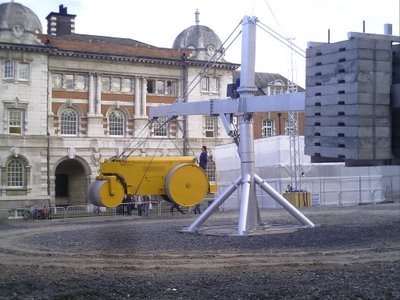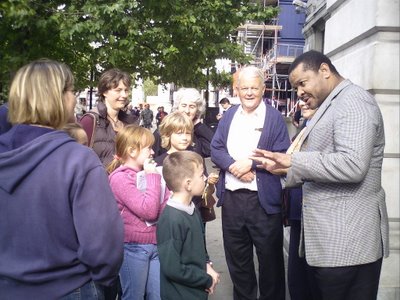Collins poses a question or a challenge to people in the city:
Come and tell us how appearing on a TV chat show has ruined your life (Istanbul)
Come and dance for eight hours non-stop at a disco (Ramallah)
Come and do a karaoke version of a song by The Smiths (Bogata)
Come to a hotel and remove articles of your clothing (Baghdad)The trivial nature of the challenges could appear insulting given the serious predicament of some of those cities. But Collins gives people the time and space to talk/sing/dance/pose for themselves. The challenge may come from a globalised nowhere, but the work itself reflects the people who stepped forward to answer it.
I've got tickets to see him talk about his Turner Prize entry on November 22.
The Turner Prize exhibition at Tate Britain has four artists exhibiting side by side for three months, then on December 4 one gets chosen to win the prize. I'm sure Collins will win. The opening hours of the exhibion are from 10am to 6pm each day. Collins is showing an eight hour long film (Return to the real), that starts at 10am each morning and finishes at 6pm. He hasn't left time for you to look at the work of the other artists.
The film consists of eight one hour long interviews with people talking about how appearing on a chat show ruined their life. You watch it in a room that is like a cinema, except you don't sit facing a screen. There are two screens : the one on the front wall shows the interviewee, the one on the back wall shows the interviewer. You sit on a side wall, and you have to turn your head from one screen to the other to follow the conversation, like watching a tennis match.
The interviewee has a single colour backdrop behind him or her, as though packaged for future television broadcast. The interviewer has no backdrop, you can see the studio monitors and equipment behind him, and the odd colleague wondering past to adjust a setting.
As you listen you realise that the tone of the conversation is intimate, undermining the gulf between the two roles, the two backdrops and the two screens . They may be on seperate screens now but when it was recorded they were sat facing each other, near each other. The conversations make no acknowledgement of the fact that they are destined to be viewed by people arriving half way through the interview. There is no summary of what has gone on before, no hype, no razzmattazz, no attempts to package the story or the person as being more interesting or more sensational than they come across in their own words.
Collins started with the chat show formula, with a sensational question about an intimate part of someone's life. He took the formula so far and then dropped it to leave us with a normal unsensationalised conversation. Just as the interviewees had, after appearing on the chat show, been left back with an unpackaged, unsensationalised life to lead.
If you do arrive half way through an interview and want to catch up on what you miss then you have to return to 'Return to the real' on a different day, but this time arrive a little earlier (or spend a bit less time looking at the work of the other artists).
When you leave the little cinema you pass by the second half of Colllins entry: a working office for Shady Lane Productions. You can look through the windows of the office and see Collins and his team working on his next project which is a challenge to the people of Britain, similar to that issued to the people of Turkey, to come and tell him how appearing on a chat show has adversly affected their life. You can open the window to the office if you want to chat to them, or want to volunteer your story to them.
A great idea by Collins, using the Turner Prize to repackage his last project (he did the work for Return to the Real for the Istanbul biennale in 2005) and to get free office space, heat, light and publicity for his next project. It works for me: its as though he is projecting his project forward in time and space. And projects are meant to be projected. Especially projects by film makers.


